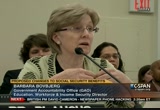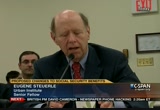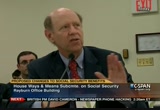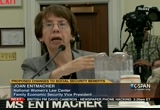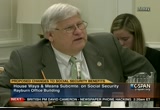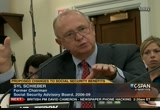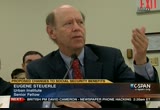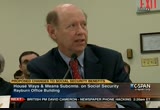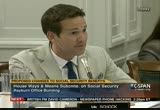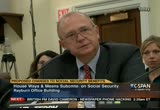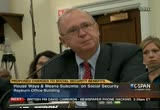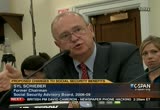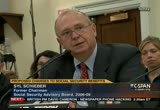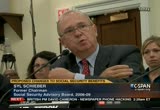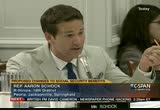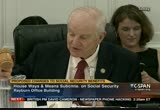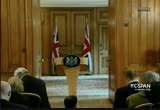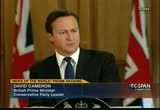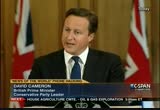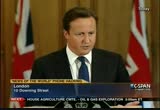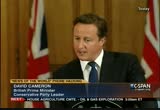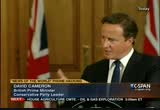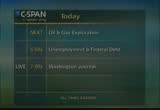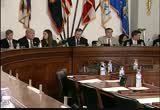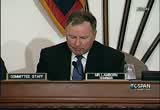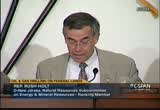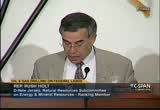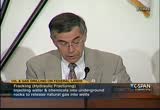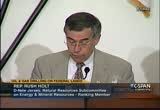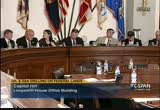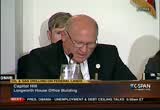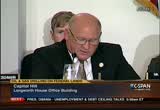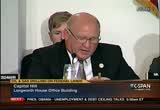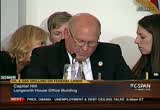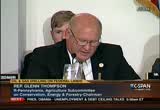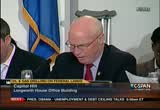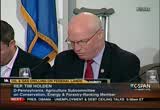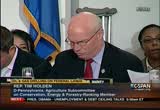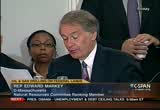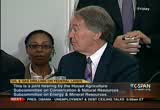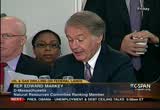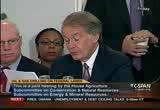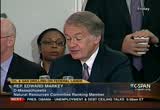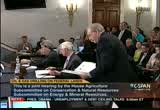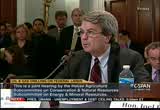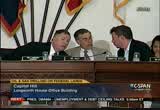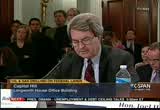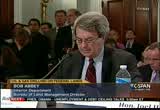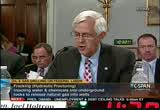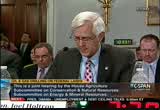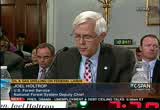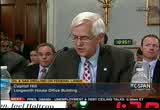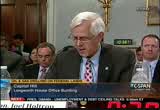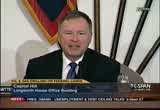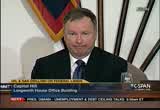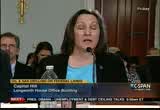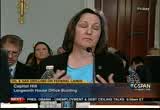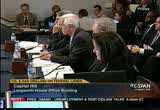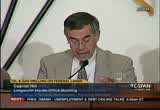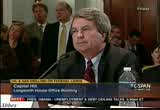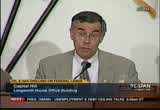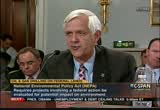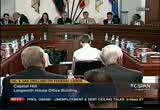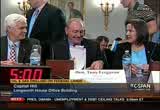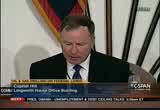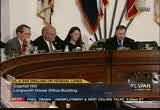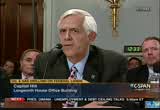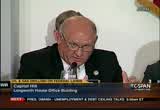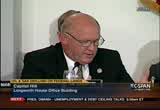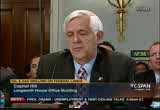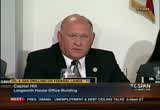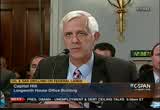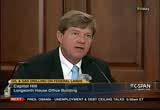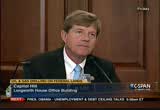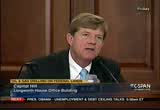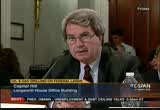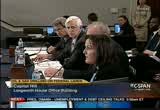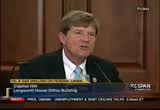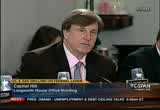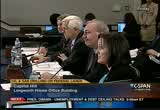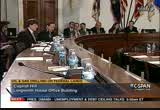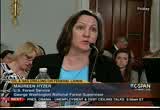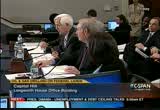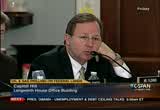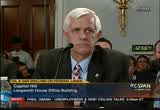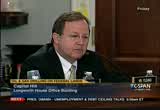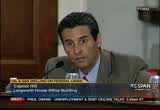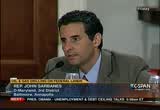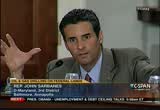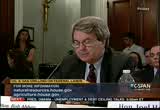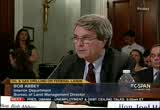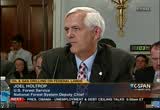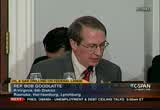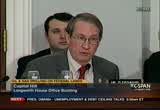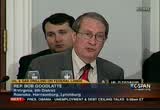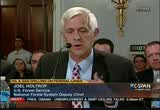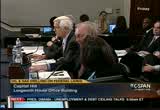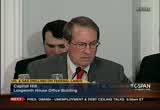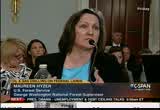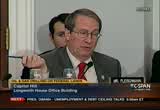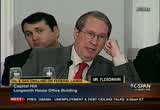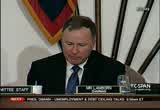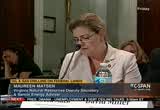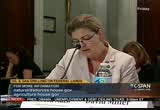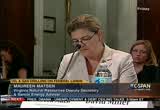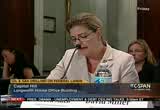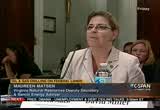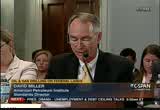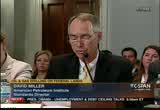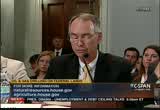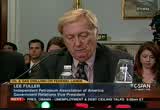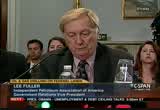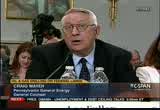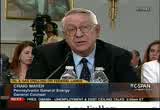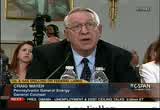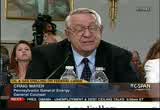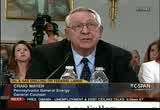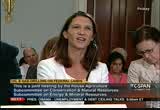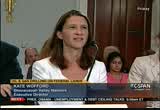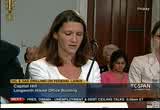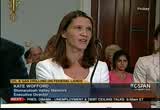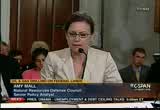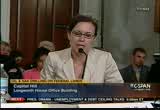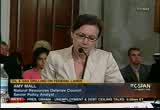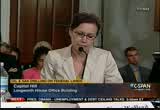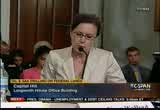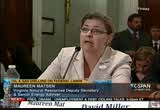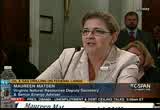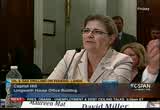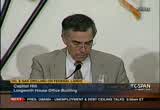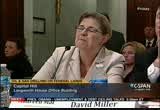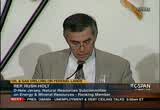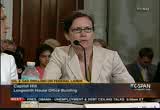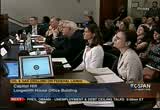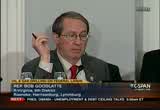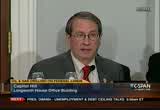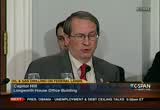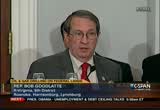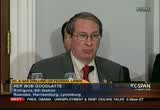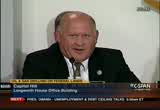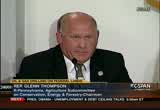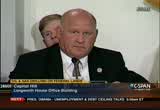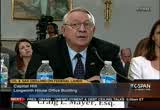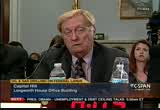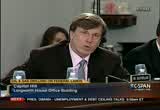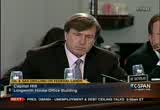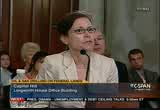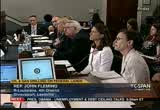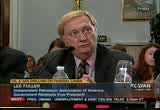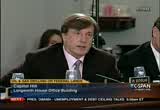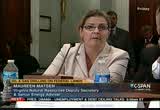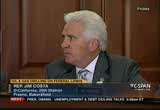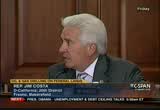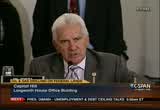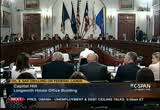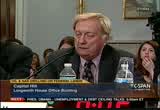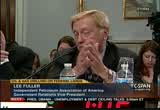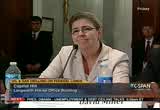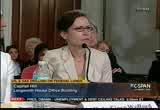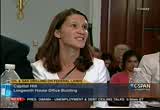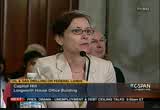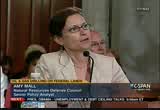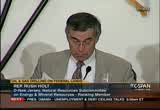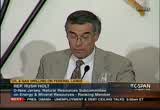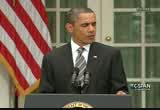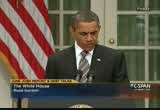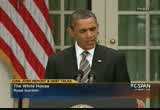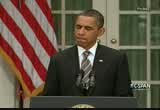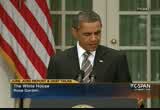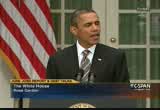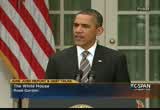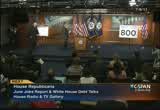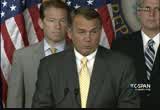tv Today in Washington CSPAN July 9, 2011 2:00am-6:00am EDT
2:00 am
really important, but we do need to make decisions, and everything should be on the table. >> good testimony. >> you started to touch on private pension reform toward the end of your remarks. could you elaborate on that? >> in great britain they undertook of reform. they had a white paper and a study on what they should do. they concluded it would be useful to increase private savings at the same times so security reform. it actually increased benefits and the public system. but they decided that that was not enough. it was indexed at a lower rate. to really help people, we really needed to build the private pension savings.
2:01 am
if you look at the private pension system, it covers fairly poorly most of the population. i have not quite updated it, but it says that for 75% of people that retire, social security and medicare is in excess of all of their private assets. we have a larger extent of the population dependent upon social security and medicare. how do we deal with it? one way we do what it is be -- we tried to increase some of those cash benefits for lower and moderate income people. from the middle-income people, i do not think we can get thereby adding to a system that is out of balance. we need to recognize that private retirement system is not doing a good job of covering the vast majority of people.
2:02 am
it is almost beside the question we need to figure out ways of enhancing the savings of middle income people as they move towards retirement. >> thank you. you mentioned that there is public support for revenue increases to social security. could you elaborate on that? >> the raising the cap on taxable wages is certainly one option that is very popular. there are also at some polls that to people say, i would pay more in social security taxes to strengthen the benefits that people rely on. this is one area of tax for people say, i do not mind paying social security taxes because i know what i in bidding for it and i would pay more to protect social security.
2:03 am
in the past, in terms of automatically legislating for need and the future, there has been scheduled small increases in the payroll tax to make sure that social security stayed in the balance. this is something the public says they support some of the proposals for improving and strengthening social security were part of the discussion. again, i am not saying wait until the last minute. i agree with chuck. it would be very bad to wait. if there was a process of public education about how we are strengthening the program, making it better, making it more adequate, everyone is going to be chipping in a little more. people who are very wealthy will be chipping in a little more. i do not know whether it can be done without increases far in the future, but this is what the american people said they want.
2:04 am
they want a stronger social security system and they're willing to pay for it. >> what would determine the very wealthy? >> at this point, everyone of of about $107,000 is not contributing to social security. >> contributing to social security? >> you're quite right. it is the end, above that amount plus other forms of compensation such as health care benefits that are not part of the social security base. >> ok, thank you. i yelled back. >> -- i yield back. >> thank you, mr. chairman. in the last 24 hours, we have begun to hear about the concept of cpi instead of the traditional method. could each of the panelists talked a little bit about that concept?
2:05 am
maybe describe to the public that is watching this hearing, described to them this concept. why it might be an important part of the solution to this problem. >> there is been debate about the cpi. what is the appropriate cpi? there is concern about what is in the market basket to value what is happening to the price of the goods we consume. the argument basically between the chain cpi and the current cpi, in the current, many people did not believe that we consider when the price of goods -- let's pick out a car. if the price of a mercedes goes up, maybe you do not buy the mercedes.
2:06 am
you bite and -- you buy an audi. the current does not take that substitution into account. it extends to things beyond too expensive cars. the argument is that this new cpi more adequately reflects or more closely reflects the cost of what living is over time. the problem with any market basket is that you pick any specific individual and they probably did not exactly consume that particular market basket. it is an estimation to try and get as close as we can to a reasonable rate of increase in the cost of living for people. the argument is being made on technical grounds that we should move from the current system to an alternative system.
2:07 am
>> the question about what the proper mix that goes into a basket of consumer goods to accurately measure inflation and its impact on indices, i will say that we have -- are aware that a change c.p.i. would likely produce a lower measure of inflation will work to the point where if it were to be implemented and used to inform the cost of living adjustments, it could close as much of a quarter of a long-term deficit. >> i tend to favor coming up with a good measure of c.p.i.. i think it causes problems and social security. that is because for people who have not retire debt, the adjustment does not affect their
2:08 am
growth and benefit. your benefits keep growing by 10,000. that does not go down. the cpi gets people once they retire. when the first year of retirement, and if you have an adjustment it might be one- third of one%. that compounds. the person who is 85 or 90 has a 10% cat. you end up with a much bigger cut on the older elderly. i want to make the system built in the opposite direction grade i want to increase benefits at older ages. i want to cut back on the benefits at early ages. my problem with doing acp i only without worrying about that issue is that i want to backhoe the benefits. i want to protect the really old, for whom there is not much incentive to work because they cannot bear it that is --
2:09 am
because they cannot. that is my concern with the cpi. >> the problem with switching its -- for social security is -- switching to the chain the cpi for social security is that it is a program that serves people who are elderly and people with disabilities. it also serves them children, but the vast majority of beneficiaries are elderly or people with disabilities. what is different about them from other consumers is that they spend twice as much of their budget on health care. that is for all people 65 and older. for people 75 and older, and they spent 2.5 as much as consumers generally on health care. the reason that matters when you're trying to figure out what the fair cost of living adjustment is that health care costs rising much faster than everything else. a few are already spending a much bigger share of your budget of something that is rising much more quickly, a cost-of-
2:10 am
living adjustment that might be fear for other purposes or for other people is really systematically on fair to the elderly. in fact, the euro of labor statistics -- >> your time has expired. >> finish your statement. but the euro of labor statistics hide a special c.p.i. for the elderly. by that measure, our current cost of living index underestimates the cost of living increases that elderly people experience. >> you are recognized. >> thank you, mr. chairman. thank you for hosting this important hearing on a very important topic. it appears that there are some in this room that believed in a policy of the ostrich. did your head in the sand along enough and it will go away. the reality is that we have a
2:11 am
problem. i think he might be best to answer this, doctor. we hear about the fund eventually running out. remind me again how many years is that estimated to be? but the latest estimate is 2036. about 25 years. of 25 years. you said earlier that that is likely to be -- >> 25 years. >> you will be around 50 bad. >> board willing. -- lord willing. in 2036, we deplete the assets. in 2037, if you are a recipient of benefits, and you are to get $1,000 a month, what happens? >> the next month, you'll get $750.
2:12 am
>> $750. that goes for a year? >> you get a monthly check. >> the first year after the year in which we deplete the assets, we go down to 77% of being able to meet liabilities. the second year, what happens? we have accrued 23% of last year's liabilities that we have not been able to pay, so now the second year, what happens? bucks under current law, social security cannot borrow money. social security would be making payments at that juncture. at the rate at which money would be coming in. the rates are projected to be relatively constant. it would govern -- it would governed along somewhere along 75% or 78%. of course, if we have one of the happy experiences which we may have some time in the
2:13 am
future like the one we have been for the last couple of years, and revenues drop significantly, it might not be 75%. it might be 60%. no guarantees. >> what i am having a hard time understanding, why do we continue to send statements to people who might be around 50 years from now to tell them to expect a certain benefits when we know today at the truth to be that under the current system, they cannot -- they should not base their retirement on the current expectation. >> the statement has included generally a comment to the effect that the system is underfunded. congress is either going to have to do something or benefits
2:14 am
could be reduced in the future. but the reason they cannot send out a state mental to people who are 50 years old or 40 years old and sick, by the way, here is one calculation. your benefit is only going to be 70% of that. because of the letters that those of you sitting at this table when it did in response. >> isn't that the truth? it isn't current law said that based on the current assets and 2036, they will only get 77%? >> the revenue aspect defining how much is going to be collected and there is a benefit formula aspect to it. a lot says something right now that is inconsistent in these two segments of its corpus. the general public does not
2:15 am
have a complete appreciation of what is going on. generally, they know something is wrong. we go off and we propose to them that there is some magical solution. we hear all the time about these surveys. the public would like to pay more for social security rather than having benefits. how would you like that done? tax people who are earning more than $106,000. that is not the american people, not the american workers bang for the. if you look at table to in my presentation, the people they want to raise taxes are already getting back less than 50 cents on the dollar for what they are contributing fdr thought this was wrong. the early architects thought this was wrong. robert ball repeatedly said that these low rates of return are wrong. what they are talking about doing is exacerbating it because the american people are willing to pay more taxes.
2:16 am
>> i see my time has expired. it seems to me to send out a statement which we know to be false under current law -- when i retire, 40 years from now, i should plan based on my current income to receive $3,000 a month. it says, is social security in trouble? no. it went on to say that under current law, it is required to meet the obligations. all i am suggesting is that for someone who was not in congress, who was not privy to this information, but only privy to the statement by which they are sent from the social security administration, i think it is disingenuous and it is misinformation bread it is similar to a ponzi scheme that we send people to jail for.
2:17 am
i appreciate the chairman's continuation on this subject and then look forward to working with him. our ranking member when he realizes we have a problem and tries to help us fix it. >> i realize the problem, but it is not social security. that seems like all of our witnesses think our social security is the problem. thank you for your comments. i think this has been beneficial to all of us. thank you for being here today. in 2036, according to you, 75%, i am told 77%. congress and the president need to find common sense solutions to make social security secure, sustainable. the sooner we do so, the sooner we can protect those who are most vulnerable. thank you for being here. the committee stands adjourned.
2:18 am
2:19 am
primary and caucus states. visit us at c-span.org /campaign2012. >> the c-span networks -- providing coverage of politics, public affairs, nonfiction books, and american history. it is all available to you on television, radio, online, and on social media networking sites. find our content anytime through the c-span video library. we take c-span on the road with our digital content bus. it is washington your way. the c-span networks -- now available in more than 100 million homes, created by cable, provided as a public service. >> british prime minister david cameron fielded questions from reporters on the phone hacking scandal at the "news of the world." one man was arrested on charges relating to the phone hacking scandal. this news conference is 45 minutes.
2:20 am
>> good morning, everyone, and thank you for coming. over the last few days, the whole country has been shocked by the revelations of the phone hacking scandal. murder victims, terrorist victims', families that lost loved ones who sometimes defending our country, that these people could have their funds have been two to yield -- could have had their phones
2:21 am
hacked into to yield stories for a newspaper is simply disgusting. i cannot think what was going to the minds of the people that did this. that they can get into anyone's phone is disgraceful. but a young girl missing from her parents that was later found to be murdered is truly despicable. this scandal is not just about some journalists or one newspaper. it is not even just about the press. it is also about the police and about how politics works and politicians, too. i want to be very frank about how, as a country, we should deal with this. people want to know that three things are going to happen. that action will be taken to get to the bottom of these specific revelations and allegations about police investigations and the rest of it. that action will be taken to learn a wider lessons. and people want clarity. rio clarity about how this came to pass.
2:22 am
about the responsibilities we all have for the future. that is what this country expect at this time of crisis. i want to make sure that everything that needs to be done will be done. first, we need action to get to the bottom of the specific revelations and allegations that we see. it is clear that there have been some illegal and -- there is a large scale police investigation is it is plainly inadequate. this is itself requires investigation. the second allegation is that police officers cut payments. with my full support, they
2:23 am
brought in the independent commission to overlook this. those investigating the police, who has full independent oversight. police investigations can only get you so far. what people really want to know is what happened, and how is it allowed to happen? the deputy prime tester and i agree that it is proper to establish a full public inquiry to get to the bottom of what happened. a judge needs to be in charge, so there is no question that it is totally independent. why did the first police investigation fail? what was going on at news of the world and at other newspapers? the bulk of the work can only happen after the police investigation is finished. that doesn't mean we can't do
2:24 am
anything now. we will consult on the terms of reference, the powers, and what we can get started, we will get started. i want everyone to be clear. everything that happened is going to be investigated. he witnesses will be questioned by a judge under oath and no stone will be left unturned. we need actions for wider lessons of the press. this is something we can get on with straightaway. that is why i want to establish a second inquiry to begin at the earliest available opportunity. it should be conducted by credible panel figures that draw from a range of different backgrounds should be truly independent without any motive but to seek the truth and clean up the press. the second inquiry showed the
2:25 am
culture of the british press. they should look at how our newspapers are regulated and make recommendations for the future. our press is free. it is essential components. but the press are not above the law. there is much excellent journalism in britain today, but the way the press is regulated is not working. the press complaints commission has failed. in this case, it was pretty much absent. therefore, we have to conclude that it is ineffective and lacking in record. competing newspapers to judge each other. as a result, it lacks public confidence. i believe we need a new system
2:26 am
entirely. lester in prison and is that it should be truly independent of the press so that the public will love the newspapers will no longer be solely responsible for policing themselves and independent of government. how politicians are not going to try to control the press. this new system of regulation must strike a balance between an individual's right to privacy and what is in the public interest. it should of pull the the proper decent standards. in the days ahead, we meet with the leader of the opposition to discuss exactly how they should be run. if we are going to discuss the way the press is regulated, it would be much better to do this on a cross party basis. people are also talking about their respective bskyb bid.
2:27 am
they must follow procedures. but that is what the cultural secretary is doing. his role is to take the advice of the independent regulators and as the department made clear this morning, how this will take some time. there is, as i have said at the outset, it is not an easy one for me to answer. it is my responsibility to try. how did we get here? as we consider the devastating revelations of the past few days, it is no good to point at that individual journalists or newspaper. the truth is, we have all been in this together. the leaders of all parties, yes, including me. during the last government, the
2:28 am
police investigation was undertaken. not enough was done. there were reports from the information commissioner. there were reports, but there was no follow-up. after all of the concern, the government at the time did nothing, and neither did the opposition. it is difficult for politicians to call for regulation of the media. we are accused of wanting to stifle a free press or free speech. the deeper truth is this. there is a less noble reason. because of party leaders were wanting to win the support of newspapers, which turned a blind eye to the need to get on top of the bad practices and change the way newspapers are regulated. the people in power knew things weren't right, but they did not
2:29 am
do enough quickly enough until the full mass of the situation was revealed. the truth is planned for everyone to see. you can downplay its or deny that the problem is the. you can accept the seriousness of the situation and deal with it. i want to deal with that. these inquiries give fresh chance for a fresh start and i want to take it. it is healthy that politicians and journalists to speak to each other and know each other. democracy is government by explanation. this is a wake-up call. over the decades, politicians and the press have spent time courting support, and not confronting problems. it is on my watch that the music has stopped.
2:30 am
i am saying loud and clear that things have got to change. the relationship needs to be different in the future. theret going to pretend is some nevada in total -- nirvana in total transparency and technical perfection. that is not real life. we can do a helluva lot better than what we have done so far. it is vital that a free press can tell the truth to power, it is equally important that those in power tell the truth to the press. let me say this about a couple of the individuals concerned. he worked for four years as director of communications resigned from the news of the world because of the things that happened on his watch. i decided to give him a second chance to and no one has complained about the job he did.
2:31 am
he resigned again. the decision to hire him was mine and mine alone. i take full responsibility for it. on the case of rebecca brooks, i don't think it is right for the prime minister to start picking and choosing who should run and who should not run media organizations. it has been reported that she offered her resignation over this. in this situation, i would have taken it. before i take your questions, let me say this. for people watching this scandal unfolded, there is something disturbing about what they see. just think about who they put their trust in. the police to protect them. the politicians that represent them, and all of them -- a political system that people think is on their side and a
2:32 am
press that is yet free and vigorous and holds those in power to drive them completely mad. we need a free press that is all so clean and trustworthy. that is what people want, that is not what i want. -- and that is what i want. and i will not rest until we get it. thank you for listening. i'm very happy to take some questions. >> we have asked him many times -- you many times about your decision to appoint an be as your main communications man. you said that he resigned and paid the price. given that hundreds of people lost their jobs yesterday, given that the editor said that he warned you of what they might have had and you would have known what would have happened under his watch, is and it's time that you not only take responsibility, but you screwed up?
2:33 am
you got it wrong. you made a mistake and for that you apologize? >> i made that decision to employ him. he had resigned from 01 " news of the world." he said at the time that he did not know what was happening what was happening on his watch and he paid the price. my decision alone to give him a second chance. he worked for me in opposition, and government, but the second chance did not work. he had to resign all over again for what happened. i don't think it is particularly meaningful today to try to put a different lost on that or go over it again in a different way. people will judge me for that and i understand that. that is the decision i made and that is what i am going to say about it. people will judge or the they think is right to give someone a second chance, or they don't. that is the decision that will have to take. i don't know what these people
2:34 am
did know or did not know. i don't think any of us knew what they did know or did not know. when you are investigated by the police and the truth is out, it won't be a question of whether not have jobs, it is a question of whether or not they're going to be prosecuted and punished. that is what needs to happen. indeed a police investigation and the public inquiry. as prime minister, people want to know if i am going to soar this issue out. inquiries to get to the truth. a proper police investigation, no cover up, and yes, some frankness. the relationship that became too close. we were all wanting the support of newspaper groups and broadcasting organizations. do we spend enough time asking questions about how the
2:35 am
organizations are regulated? no, we did not. there is a new chance to do that and does what i am saying we are going to do today. people will decide if it was ready to give some my second chance horne nodded. -- to give someone a second chance or not. i can tell you the checks i made and the questions i asked. i do think it is right to try to judge an individual by the work they did for me. if i had employed someone who was given a second chance and when they worked for me, they did terrible things, then yes, i completely understand how people have a right to say, why on earth did you do that? i made the conscious choice to give someone a second chance. he worked for me well but he decided in the end that a second chance would not work. he had to resign all over again for the first offense. that is what happened. and that is the best way to describe it.
2:36 am
>> at issue here surely, is your judgment. why did you believe the man that had resigned over that? and why did you ignore those that warn you it was widespread? why do you doubt say that as leader of the country, you can't say anything about the planned takeover of one of the country's biggest broadcasters? by an organization that has been proved to be a holy? -- to behave appallingly? >> first of all, why did i take this decision? i saw someone who had paid a price for what had gone wrong under his stewardship who resigned because of what had gone wrong. there was a police investigation ha, there was a trial. there was someone sent to prison.
2:37 am
he said that he did not know what was happening at the news of the world and i decided to give him a second chance. that is all i can do. i think i am also perfectly right to except -- >> you have explained why you hired him. but you fired him when many -- hired him when manning -- many people were saying that it was widespread and when many believe will believed it was simply impossible for someone to say, nothing to do with me. >> and no one gave me specific information. i looked for assurances and received assurances. i commissioned a basic background check and i am not hiding from the decision i made. there had been a police investigation. someone was sent to prison. as editor had resigned. he said he did not know what was happening on his watch, he resigned when he found out. i thought was right to give him
2:38 am
a second chance. all i can do is set out my thinking, had to think it is fair to say, as someone who ran to medications, people did not -- communications for the conservatives in opposition and in the government, people did not have a complaint about how he did his job. in some contrast, the have reduced -- that produced dodgy dossiers. the second is, who is right to try to take this issue forward and deal with a very complicated in a difficult set of questions. how do we get to the groups of what went wrong the first time around? how do we make sure the relationship between the press and the politicians is more helpful. the mistake made by all of us, including wanting to get good coverage from newspaper groups. if you can recognize the depth of a problem, set out what the
2:39 am
solutions are, you have a good chance of taking the country with you and getting to a point where our democracy is in better shape, the police is in better shape. that is what needs to happen and that is what i am determined to do. >> how was it right to close the news of the world? to use your terminology, with hindsight, was there anything hon -- anything unhealthy about your interaction with the murdoch's. and do you think that they are fit and proper people to run bskyb. >> it is not my decision about which are open and which are closed. some mornings i would like to close all of them. i think the problem here is that it is not the paper. it is the practices.
2:40 am
what needs to change is not the name of the newspaper, what needs to change as the practices the golan and make sure that -- the practices that go on and make sure that they are illegal and properly -- legal and propylene -- properly accounted for and properly managed. it is not fair for me to say what remain open and remained closed, but i set up the processes and inquiries to make sure that we don't have these things never happen again. on hindsight and the relationship with murdoch and the rest of it, you are bound to, as a party leader, wanting to have a relationship with journalists and you do that because if you have a mission to try to explain how you want to change and improve our country. that means talking to the head of the guardian, you get out there and do it. that is what i have done for the last five years. the problem we are correctly
2:41 am
identifying is because leading politicians feel so passionately about wanting to get that message across, not just with the murdoch's, we don't actually saugh had spent enough time -- stop and spend enough time asking, is this organization behaving properly? is the media properly regulated? heart problems being uncovered by other organizations that need to be dealt with? that is the problem. it is not the nature of the interaction. is the failure to ask the fundamental questions about media practices and the rest of it. that is not just about relationships with news international. that applies to everybody. and the thing that is where we have a genuine opportunity, he sort of cathartic moment for politicians and media groups to say that we're going to have these inquiries. they will be difficult for everybody to learn the lessons
2:42 am
of. they will come out with a new way of regulating the press that ensures freedom and responsibility. and politicians will step up to the plate and stop trying to get favor with the media and regulate properly so that we have a better situation. the point i make about this is that there are proper organizations and procedures for looking at mergers and takeovers in this country. people have concerns about competition. they have concerns about who is fit and proper and right to run a broadcasting license, a think it is important that this is done in the proper way with advice from the proper bodies. is improper for her a prime minister to say -- that would take us to a very dangerous place.
2:43 am
left proper bodies to look a plurality. they must all do their job and based on the relevant and up-to- date information. let's have channel 5. >> you're saying you want everything to change, but that is after everything has come crashing down this week. you did have the chance to take the lead as party leader and you did not do it. are you sorry that you did not do that out? >> i don't really accept the premise on that question. i said that we are going to have not an inquiry but inquiries. i am starting to set out how they're going to work. i am also being very frank which is not easy for politicians. i think you're missing part of
2:44 am
the point, what has gone wrong in the relationship and to a except part of that responsibility. there is a similarity were frankly, you could point to some parties having a better record than other parties. but the politicians have not spoken up about it and they needed to. the question is, are you awake and doing something about it? as i said this morning. i believe i do. >> you have said that people will judge you about your decision to hire him. it is difficult for them to do that until they know what questions you asked of him. you asked questions and you
2:45 am
referred to a background check. can you tell us when you've got assurances, or they assurances in the broad generic sense about whether he might cause you any trouble in the future, or whether you said that with him and asked him specific questions. that was that just one conversation before you hired him? or was it a conversation he repeated last year. >> there are some specific assurances and the general entrances as you would expect. there was a series of meetings we had after he resigned from the news of the world before he came to work with me. i think your point, how can people actually the is a good one. the truth is, i asked for assurances. he said he resigned because of what happened but he did not
2:46 am
know that hacking had taken place. as we stand today with police investigations, we don't know who knew what about what. that has now got to take place. and people will see not whether they have the right to resign from their jobs, but whether they will be prosecuted and found guilty of something worse. all i can say is what i did, the decision that i took. the fact that i employed him. he did his job in extremely respectable way and was a very good individual to work with. he was very much liked by the people he worked with and that is why he came into the downing street operation. but he found that the second chance did not work because of his need to reside the first time for what happened on his watch, he had to do that all over again.
2:47 am
that is the history of what happened. i have tried to ask the question as best i can. there we are. daybreak. sorry. >> you talked about the public inquiring and giving us more details, there are those that say the inquiry could start now, and are you concerned that we can hear the shredding machines in various places, perhaps losing some of that very vital evidence? >> we can start getting together the terms of reference, some of the paperwork. what you can't do, if you can't start a full on judgment inquiry questioning witnesses about what happened at the news of the world while they're also being questioned by the police. the inquiry into detainee's is
2:48 am
quite a good example of this. there is still one criminal case over this. he got his committee together and they can't actually get started on the meat of the report. the have to wait to the end of this criminal case. we could have many more that will take even longer. i want to get it suited out -- sorted out as soon as possible. i am chomping at the bit to get the judicial full public inquiry set up. i want us to give these things sorted. it is this black cloud hovering over the parliament and the police. i am determined to do it, i have set out every comprehensive plan for how that is to be done.
2:49 am
>> are you saying that at the time that he came to downing street, the senior official was warned that he had links to the former private detective that was facing trial for murder? and secondly, can i check with you that he authorized payments to cover up illegal activity? >> on the issue of what i was told, i wasn't given any specific factual information. the decision i took was right from the beginning, very bad things had happened, he had resigned.
2:50 am
i give him a second chance. he proved himself as an effective person, and it was acceptable for him to come. he was the decision will be held responsible for. he wasn't given any specific information that would lead me to change my mind. i watched your editor on news night last night. i don't recall being given any information. the decision i made, i kept it under review but felt it was still the right decision that he resigned over what happened and he proved himself at his job and he should have a second chance that i wanted to give him. the second chance did not work and he had to resign all over again. >> was a member of your staff was warned? >> on james murdock, i read the statement yesterday. it raises lots of questions that need to be answered in
2:51 am
these processes are going to have to answer all those questions. i will get to the wall. >> hugh compared to the expenses saba and the need for daylight, sunlight, and transparency. i am not clear on if you're setting new daylight with your interaction with proprietor's. people might go away thinking this is the same hold horse riding. what i tell us you're going to do something that we can measure you against? on this other thing, you keep saying you don't want to gloss over things, but aren't you in danger of doing just that? didn't you just turn a blind eye to what every person knew?
2:52 am
>> on the issue of daylight, i have an agreement with that. it should be looked at what the government has done. it is not just of data about public services, it is data about meetings and i think a regular roster of people that have come for meetings here. i think there may be room, and maybe we can start on it earlier, for more transparency about meetings. we do that a lot with the lobby groups and interest groups. it is a good agenda. there may be some questions if suddenly every journalist had to publish every meeting they had. but it is worth looking at. on the issue of andy, i accept he was editor of the newspaper were very bad things happen.
2:53 am
at the time i made the decision, there had been a police investigation and a member of staff prosecuted and imprisoned. what looked on the surface of the, a proper investigation had taken place. it seems that he resigned for what had happened which he said he did not know about, it was reasonable to offer that person a second chance. i can only repeat of the thinking i went through and people will judge me on that. the point i put in is that you also have to judge him on the work he did for me. that is important. on the question of judgment, if the person who was accused of doing these things, did some terrible things working for me, it would be a different point. i can only put the way i felt
2:54 am
about it the many ways as i can. i will get to you in the end, i promise. i watched your program last night, so that as a good start. i wasn't back at 10:00. >> of the subject of a certain individual in your employment, as does a hypothetical question, if someone who gave you assurances about criminal activity and then proves to have told you the wrong thing, lied to you or certainly misled you, would you feel betrayed by the person? >> if you are given assurances that they turn out to be true,
2:55 am
you are in a different situation. i looked for assurances, i was given assurances and i appointed someone knowingly that had resigned because of what happened at the previous organization. i took the decision to give that person a second chance. i can only describe in asking it is. >> when the guardian came out with the story in the summer of 2009, shouldn't you have called him in and said, what is all this about? tell me everything. and when he resigned in january, did he wore new that more was going to come out? did you ask them? and specifically, did he tell
2:56 am
you about the males indicating that he had authorized payments to policemen. >> of the last question, i did not know about the e-mail and we did not discuss that. on the issue of his leaving, this is something we discussed before christmas. it wasn't in the light of any specific thing. a second chance wasn't working. he was given a second chance, he was working very hard for the government of the country and was finding it impossible to do his job because of the allegations and the conclusion he came to, rightly, was that the second chances of working, i have to resign all over again and it was the decision that was made. >> at that point, shouldn't you have said, tell us what is to come? >> does not the conversation that was added. even at that point, he was finding he could not do his job because of allegations swirling
2:57 am
around. during his employment, of course we discussed this issue. i saw no reason to alter the assurances he gave me. as i said, the second chance didn't work and he resigned all over again and he is now under police investigation as others will be. the police investigation has to go forward unhindered. i think it is important people of this. it is a properly resolved police investigate -- police investigation that doesn't involve any of the police from the earlier investigation. that is the absolute priority now. and we can go to the inquiries that can give us a much richer understanding of what went wrong. >> did you will have in and say, what went on here? >> i had conversations with him, but it never changed any of
2:58 am
my assurances. sorry. >> since he resigned, have you been in contact with him? is he still a friend? >> i have seen him recently, not frequently. when you work with someone for four years, i became friends with them. i think he did his job for me into the conservative party, a various effective way. he became of friend and is a friend. i haven't seen him, i have been quite busy over the last year. you make friends with someone when you work with them for four years. it would be abnormal if you did not.
2:59 am
>> could this be your equivalent of tony blair's iraq moment? may you now need a second chance? 1987 that chance if it turns out he lied to you? lied to the country -- >> that is the responsibility i have, and people will make judgments. it is different, frankly, taking money for tobacco advertising and starting a war. i think it is different, but
3:00 am
5:00 am
cases of contaminated water, unhealthy air pollution, and scarred landscape are too common in the rush to develop natural gas. some say this industry is mature and has sufficient safety and environmental standards in place, but today's oil and gas well is not your grand father's oil and gas well. wells are deeper, drilling is more intensive, and there are growing concerns about impacts to wildlife, human health, communities, and public land. the george washington national forest is a popular location for hunting, fishing, camping, and other outdoor pursuits. it's home to the head waters of the potomac river, which helps supply drinking water here in washington, d.c. it appears the u.s. forest service has correctly taken a precautionary approach in assessing the impact of natural gas production on water and other resources in the george washington national forest before moving forward to approve any new drilling. while there's growing understanding of the environmental impact of oil and gas development, much remains unknown. there has been little scientific investigation into the wide range of potential environmental impacts from this
5:01 am
very complex industry. federal agencies have begun conducting their own inquiries into various aspects of oil and natural gas operations. for example, forest service research in west virginia found that forests suffer permanent changes from drilling operations, including ineffective erosion controls and toxic waste disposal methods that kill vegetarian. they found unexpected impacts could not be carefully controlled, planned for, or mitigated. the u.s. geological survey has found the knowledge of how drilling and fracturing might affect water resources hasn't kept pace with the expanded use of these technologies. the usgf stated that "agencies that manage and protect water resources could benefit from a better understanding of the impacts that drilling and stimulating shale wells might have on water supplies." many uncertainties remain, but drilling on federal land continues to proceed across the country. the bureau of land management has been approving permits, and there are more than 38 million acres leased.
5:02 am
while some places may be appropriately protected, this is a small minority. we're concerned that current regulations, as well as enforcement capabilities, are insufficient. federal environmental laws, including the clean air act, safe drinking water act have gaping loopholes for the oil and gas industry that need to be closed. for example, the clean water act definition excludes hydraulic fluids under certain circumstances, and hydraulic fracturing is also exempt. while the department of the interior has announced new procedures, something that we strongly support, the agency has not put the strong rules we they'd into place to require new practices that best minimize environmental impacts. drilling on federal land was also abide by state rules, but they're also inadequate. the west virginia secretary of environment although protection recently said the state's regulations is "inadequate" and that the agency hasn't fully considered its effects on water, air, roads, public
5:03 am
health, and safety. a republican candidate for governor in west virginia recently stated that west virginia needs new regulations to protect community, state roads, and the environment. it's clear from blowouts in pennsylvania recently, several in the last two years, that the industry does not always use the safest practices. state and federal agencies are not enforced on the books. virginia had less than 10 enforcement staff in 2008 for 6,000 wells. west virginia, most recent report was that there were 12 inspectors for 59,000 wells. the g.a.o. reported earlier this year the department of the interior continues to experience problems in hiring, training, and retaining sufficient staff to provide oversight and management of oil and gas operations on federal lands and waters. in conclusion, it's clear to us that we need more science and research, stronger rules, and better enforcement to protect the public health and our natural resources from the risk of natural gas development. we urge the committee to work with others in congress and
5:04 am
make sufficient funds available to federal agencies to ensure they have the resources they need for these essential activities. thank you. >> thank you. now we will have questions from the members of the committee. members are limited to five minutes for their questions. i now recognize myself for five minutes. you talked about wanting a ban on horizontal drilling. i'm sure you understand that when you drill down and then go laterally with horizontal drilling, you can go great distances. in fact, i think recently, a record was set of nine miles from the vertical well itself. but you can go at least thousands of feet, sometimes miles. so you can have a single pad with multiple wells on it as opposed to 10 or 20 or more
5:05 am
vertical wells scattered throughout the surrounding countryside. wouldn't you prefer one pad as opposed to 10 or 20? >> thanks for the question. i would say, from the perspective of communities in the shenandoah valley, the concern isn't necessarily just a single foot print of a well pad. the concern really is the whole process that's associated with shale gas drilling, starting from the exploration all the way through to the waste water treatment. i mentioned the field trip that officials took to west virginia. some of the impacts they saw there go well beyond the footprint of a well pad. it is the impact on the landscape, from well pads and exrepsor stations, but also the pipeline infra trurkt, the heavy truck traffic carting chemicals and sand and cement. >> ok, but your objection is to the horizontal process.
5:06 am
>> i think the concern in the shenandoah valley, sir, is really towards the entire process of shale gas drilling. >> thank you for your honesty. i'd like to ask you a question or two. you say that virginia is interested in becoming the energy capsule of the east coast and job creation here in congress is a huge concern of ours, especially given the abysmal and discouraging jobs report that we heard this morning. if the proposed horizontal ban on forest service lands is finalized, what would that do to future energy jobs in the commonwealth of virginia? >> thank you, mr. chairman, for that question. we don't have precise numbers, of course. it's speculative to know what would happen, but i think we can look at the more than 3,000 jobs that the industry is supporting in southwest virginia today and understand that the area is about the same size as the area that would be
5:07 am
in which production would be banned in the forest and perhaps extrapolate from those facts that we are looking at the missed opportunities for thousands of additional jobs in virginia. can you respond that the state playing a role in regulation have a poor record in most cases according to one of the witnesses. i'm want sure i agree with that. could you correspond to that in the case of the virginia perspective? >> absolutely. i certainly can't agree with that. we have, as i said in my remarks, no experience with water quality degradation in virginia through decades of hydro fracturing and even the single decade of the high volume microfracturing in west virginia. not a single experience. now, not to jinx our luck, and
5:08 am
i can certainly turn to my expert to my right, but we are diligent. there's a lot of talk about being cautious and diligent. virginia and its regulators are all of those things, and we have a comprehensive regulatory scheme that goes from site examination to casing plans, all the way to reclamation to make sure that the interests and resources of virginia and virginians are well protected. >> thank you. >> mr. miller, i'll conclude with you. interestingly, and i have a quote here from the director of natural resources defense council, "if the industry can meet high standards of environmental performance for extracting and delivering the fuel, we are looking here at very good news for america's economy and industrial competitiveness, the environment, and our nation's energy security." can i industry meet those high
5:09 am
standards that will lead to the good news that mr. cav knew says in his quote? >> thank you very much for the question. we certainly believe we can. we have a long history of developing these industry standards and best practices. they're widely used throughout the country, not only in the state regulations, but also federal regulations many times over, and we have a large community of experts that develop these documents, as i mentioned in my testimony. so we feel that the strong foundation of technical work provides the blueprint we're all looking for. >> thank you very much. my time's up. i yield to the ranking member for five minutes. >> thanks, mr. chairman. ms. matsen, what is the largest industry in the state of virginia, in the commonwealth? >> agriculture, sir. >> yes. as i understand it, about 350,000 jobs in the commonwealth. >> yes, sir. >> do you know the top five agricultural counties in the state? >> they are right there in the valley, yes, sir.
5:10 am
>> yeah. three of the top five have actually commented on this subject. let me mention a few things i have here. the county of shenandoah, i may quote here in the revised management plan, the board of supervisors asks that the forest service act to aggressively protect drinking water resources by prohibiting hydraulic fracturing natural gas wells. do you disagree with the elected officials of shenandoah county? >> i certainly do not disagree with their caution. i understand they want to proceed carefully. however, i'm not aware of any threat to their drinking water. >> rockingham county is -- has
5:11 am
also commented similarly, does not support these activities. do you disagree with rockingham county? >> well, we do, sir. as i say, we agree with their desire to proceed with caution. this is an unfamiliar practice to the folks in the county. it has been going on in southwest virginia for a long time, though not in the northern part of the state, and we look forward to engaging -- >> ok, now augusta county board of supervisors "do not support hydro fracturing" as has been proposed. do you disagree with the elected officials of the county of augusta? >> we do support hydro fracturing. >> harrisonburg, virginia, you disagree with the council there when they say the forest service should act aggressively to protect drinking water -- >> again, we are not aware -- >> and you also support -- you
5:12 am
support or do not support the deck l.a. ration of the town of stanton city council asking the forest service to act aggressively to protect the drinking water by prohibiting the horizontal -- >> if acting aggressively means a ban, sir, we would not support it. >> i see, all right, thank you. now, these are not what you would call politically liberal bastions. we're not talking about berkeley, california, or cambridge, massachusetts, are we here? >> no, sir. >> all right, thank you. ms. mall, you mentioned that the usgs found that knowledge of how horizontal drilling and hydraulic fracking has not kept pace with the expanded use.
5:13 am
you go on to say the problems to provide sufficient staff are -- well, exist. and we need better enforcement in the area. it sounds like there's a lack of knowledge on how to proceed. gin that, do you think the forest service should move ahead with the horizontal drilling, hydraulic fracturing in the absence of this understanding and in the absence of this kind of enforcement? >> yes, absoluting, we think a lot more science and research
5:14 am
is needed. that's why we support the e.p.a.'s investigation into the potential risks of hydraulic fracturing on drinking water, also the department of energy is looking into this, and as we heard earlier -- >> but do you think they should allow these technologies to proceed in the absence of this knowledge? >> we think there are places that absolutely should be off limits because the risk is too great and the unknowns are great, and that would include drinking watersheds for significant populations, like the head waters of the potomac river. it sounds like the forest service -- i have not read the complete draft environmental impact statement, as was stated earlier, these are placed based , but the falls underground, the drinking water, sources that are there, it sounds like they are on the right track. >> thanks very much. my time has expired. >> we will now take one of the members of the committee out of order because he has a funeral to get to.
5:15 am
>> i appreciate this. one of my constituents from the shenandoah valley who gave his life in afghanistan is being buried at arling nonnational cemetery later this afternoon, and i do want to be there, so i appreciate the opportunity to ask questions of the witnesses before i depart. let me start with ms. matsen. have you heard from -- i've heard from these counties as well, expressing their concern about what takes place in the national forest. it's my understanding that not to the same degree we have in the allegheny national forest where 9 % of the mineral rights are owned by private individuals and only 3% by the national forest. but sub-surface rights are primarily not owned there.
5:16 am
but in the george washington national forest, it's my understanding from the national forest that 16% of the land, or about 180e,000 acres are owned by private entities in terms of the sub surface mineral rights. so if one were to see in those portions of the national forest, that land would be subject to your regulation, would it not, and not to the forest service's regulations? >> i will look to my expert to confirm, but as far as my understanding is that would be true, yes, sir. >> so you would impose the state's requirements, and i share your concern and i share the concern of the local governments that good standards be imposed before any kind of drilling takes place, and we haven't seen this in the shenandoah valley. we have in other parts of virginia, and i suspect that's
5:17 am
in part because there's a lot of uncertainty about whether there is an economically viable deposit in the area. but if there were determined to be one for that 180,000 acres, this process that we're talking about here where they're banning it would not apply to those acres. so the question is, do you think it would make good sense for the forest service to work on good technology and procedures that would be applied on their portion of the land and to work with the state and to the extent the federal government has input here on making sure that good practices are imposed, because they can't stop it on those 180,000 acres anyway. >> yes, sir. i absolutely agree there is a path short of a ban that allows us to develop those resources carefully and cautiously that would protect the interests in the forest. >> and i share the concern of those local governments with
5:18 am
regard to the quality of their drinking water and making sure that any chemicals used in the hydro fracking process wouldn't be allowed to get into their -- into the drinking water systems of those governments. but they have jurisdiction over the remaining private land in their area with regard to certain zoning regulations and so on that we can impose. have you heard from any of those jurisdictions that they have banned horizontal drilling or attempted to ban it in their jurisdiction on those private lands? >> no, sir, i have not. they have declined to act on some interest that has been expressed, but in terms of adopting a ban going forward, no, sir, i have not. >> so they've taken a case-by-case approach. they want to be cautious. i know that, for example, there was one application made in a flood plain, and that would
5:19 am
generate some concern with regard to how those chemicals might get into drinking water if you had a flood or other drinking water like that. but they have not taken the position that there would be no county-wide ban on horizontal drilling on private land, that their focus has been imposing this ban strictly on federal lands, and as we just pointed out, it wouldn't be an entire ban anyway because there would be land where the subsurface mineral rights are still maintained by land owners. again, my question for you is, given the desire on the part of some, including myself, to make sure that we are using the newest and best technology and that we are making sure that there is not degradation of the land or the water resources of the counties that i represent, not it not make more sense to have a progressive approach to
5:20 am
looking to using those newest technologies as opposed to a 15-year ban which would not be 100% effective to begin with, but also would not allow for the same kind of considerations that they are making on county -- on private lands and the rest of the county on these public lands in the national forest. >> yes, sir, absolutely. >> thank you. we will now revert to the regular members of the committee. >> thank you. one of the witnesses noticed that this isn't the grandfather's sexoil gas industry. i couldn't agree more. in my congressional district, i have 1859, and i've been there. in fact, my district office -- i won't say it's within a walk,
5:21 am
but it's within a hike of that. and frankly, i've been on a lot of well sites as well. in my office, for those -- how many of the panels have been to a marcellus well site? great. i encourming those who haven't to do that. in my office, if you don't get that far, just walk to cannon, and we'll show you the well. it is different. the science and technology, the standards, the oversight by the state, it is absolutely different. i want to share -- in terms of the e.p.a., it was stated there's no evidence that suggests the process of hydro fracking contaminates water. my friend from maryland is not here, but he didn't elude -- he specifically said that those of us in pennsylvania are contaminating the chesapeake
5:22 am
bay. i'll be very clear about that -- the blowout that he was talking about, specifically the environmental testing after the incident found there was "limited and localized impact with no adverse effects on life ." so i assure you, if there's no adverse effect, there's nothing in the susquehanna river and nothing hundreds of miles away in the chesapeake bay as a result of that. there was importance in the public input, and i can't azpwree more. public input within the communities of the national forest is obviously important. what's been your experience living and working within the allegheny national forest, the ability to fight input and how they receive and use that input?
5:23 am
>> i think it would be -- with respect to development, mr. chairman? -- at this point in time, because of the litigation and the injunction of the officers on the allegheny national forest are really not inclined to create in dialogue, they simply participate in the course of the individual notifications that come from the companies in order to work through their compensation process, which has been the practice for the last 85 years and has been so, done successfully. so, on a broad scheme in terms of talking, like on a program basis, for example, with the oil and gas association, there really isn't engagement. but on the individual level with regard to a particular project, there is, and it's particularly very constructive. you're working usually with a
5:24 am
professional oil and gas administrators from the forest service. it's my understanding shale gas is subject to eight federal laws and 11 state laws. is that true from your perspective? >> i couldn't begin to count the laws and agencies and people with oversight, quite frankly, but i certainly would be confident that aid is certainly a number to rely on. >> one opinion would be the net effect on our domestic energy supply if a ban on horizontal drilling were carried out across the national forest system. >> it's difficult to know exactly the extent of resources on the national forest system, but in those systems where shale gas or shale oil
5:25 am
underlies the national forest lands, essentially the economics hinges on the use of horizontal drilling and hydraulic fracturing. that technology has evolved particularly over the past five to seven years to allow us to have prolific development. we've gone to this shale and other shales around the country, so to suggest that limiting access to vertical wells to allow the same kind of technology, and it's a combination of the two to develop these new and extensive shale formations. >> thank you, mr. chairman. >> you're here today, i get a sense that you're speaking for
5:26 am
the people of shenandoah valley . >> no, sir, i think i'm here to provide a perspective that i've observed from the valley. >> so really, you're speaking for yourself? >> yes, and i feel confident speaking for the organizations i work with. >> you haven't brought any surveys or data? >> i have brought with me five resolutions from local governments. >> i'm not talking about government or government officials. i'm talking about the people. i assume hundreds, thousands, maybe hundreds of thousands of people, there's been no survey -- >> sir, i'm sorry, go ahead. >> has there been any survey -- i'd love to have that data if you have it here today. >> i'm confident -- >> i don't want to hear what you're confident about. i want to know the data. do you have any data, yes or no? >> no, sir. >> ok, you have no data, ok. >> ms. mall, i can't see your name completely from here, so i apologize. you indicate that there is
5:27 am
inadequate data on safety. now, again, we've established this is a technology that's been going on 60 years. it does come under the e.p.a. the e.p.a. in 2004 said it's perfectly safe. again, i've asked the question before. i've asked it many times in this committee room, not one single person has been injured or killed from hydro fracking or horizontal drilling that i'm aware of. so it would seem to me that the burden is on you to tell us what is the technology where -- i'm sorry, where is the science that it is damaging the environment or is damaging or hurting people. do you have that data here today? >> congressman, i do want to mention one case in ohio where the state -- >> well, excuse me, i want to get plenty of questions in. i don't want anecdotal investigation. >> this is a state
5:28 am
investigation that found ground water was contaminated. there are other cases around the country where the state regulators have clearly found that oil and gas operations contaminated ground water. we feel that they never asked the right questions to answer whether or not fracking was a contributing factor in other cases. >> have you brought the science on that? the study, the engineers, evaluating. i mean, obviously, for instance, there's this video going around, a quasi documentary about natural gas seeping into water supplies. we find out, when you actual al ply science to it, that that is something that happens naturally in nature. >> does happen naturally in some cases, but state agencies have found that some methane in ground water was caused by oil and gas operations in colorado and in pennsylvania. >> let me throw this to the rest of the panel. can anyone here answer that? my understanding is there's not a single proven case. i'd love to hear the response.
5:29 am
>> depends on whether you're talking about fracturing or methane. fracturing, there are no cases that indicate it's caused by contamination. methane contamination is something that can occur as a result of the structure of a well. the important factor is as you're casing and cementing the well, you have to isolate those zones. that's want a static process. wells have to be maintained, wells have to be carefully constructed, if there's a flaw in the steel, the cementing, that allows the pathway to occur that can bring methane into ground water. it's equally certain it can be there naturally. so the issue at hand is always trying to determine what's the source of the methane. if it's from oil gas and well,
5:30 am
he's responsible for fixing it. it does occur, it has been investigated by state regulators. they do occasionally find the problem, but in most of the cases that have been publicized extensively, those have generally been from nonoil and gas well sources. we have a million oil and gas wells in the country right now. we're drilling about 25,000 a year. we have a few cases that show up, and they are investigated by the state regulators, and they make a determination as to what remedy has to be made to fix it. >> and are you aware of anyone who's been harmed or even harmed as a result of leakage of methane? >> i'm not aware of any one that's been harmed by the leakage of methane associated with oil and gas operations. methane is natural gas.
5:31 am
but the truth of that matter is most of the oil that's in the ocean seeps through the ocean floor naturally, so we have to keep all of that in context. and last thing, miss matsen, you indicate that wells are regulated on a state level n. my state, we have -- at least in north louisiana, we have 12 regulators who are monitoring what's going on in all these wells. so is it correct to say that this is an unregulated industry? >> no, sir, it is not. in fact, i would say that louisiana does a wonderful job of regulating their industry. i have had the opportunity to meet and talk with your secretary of natural resources, and we think very similarly about the balance you are
5:32 am
subject to federal law in the state. >> yes, sir, just like you are. >> i recognize the gentleman from california for up to five minutes. >> thank you very much. i know a lot of the questions have been asked. i think it's appropriate to the committees to spend some time, especial until light of the fact we're going to utilize more and more natural gas as a cleaner source of energy and clearly with the abundance of the shale and the reserves that now seem to be proven to be over 100 years, will provide a lot of benefit to this country. and it's incouple bent upon us to ensure that we do it as safely as we can. as some of you know, i represent a significant portion of the county, and if it were ranked as a state in the
5:33 am
nation, people don't often think about this from california, but it would be the fourth largest producing oil production in the nation. as a matter of fact, california -- i know a lot of my colleagues, various views have off-shore drilling, but we have 25 platforms off shore and a lot of snap drilling in california. california, with 38 million people, produces 47% of its own oil needs. that gets overlooked. if we didn't do that, we would be in a much more difficult situation. we also have 20% of our energy as renewable, and we're trying to strive to 30% as renewable energy. so we are trying to balance our portfolio. it's my understanding that the bureau of land management earlier today in the forest service testified that they have no intention of banning horizontal drilling or hydraulic fracturing on federal lands.
5:34 am
is that clear, mr. chairman? i guess i'll ask that question for you because that was in the previous panel. mr. chairman? >> i'm asking a question through the chair, since i missed the first panel. i understand that b.l.m. testified and the forest service that they have no intention on banning horizontal drilling or hydraulic fracturing on federal lands. was that testified today? >> well, it was indicated, but nevertheless, we have this preferred alternative sitting there right now in the washington forest -- >> no, this administration, like every previous administration, sometimes finds itself in contradictory sort of positions, so i'm not -- i'm not -- i've been made aware of the washington situation and the proposals there. but i think as a policy, we're going to have to continue drilling and fracture if we're
5:35 am
going to take advantage of these energy sources and use all the energy tools and our energy tool box as the bipartisan legislation that congressman murphy and i have others have introduced. and i think that while you -- from time to time have problems with wells, that's why we have regulations. that's why we need to always be scrutinizing this process to ensure we can convince the public that we do this as safely as we possibly can. that's a responsibility that i think government has at the federal and state level, as well as the energy companies have to ensure that they're using state-of-the-art best management practices. mr. fuller, would you say that's the case today? >> i think the combination of things. one, the industry's regulatory structure that it operates in
5:36 am
imposes a substantial set of requirements to assure that the protection of environment and public health are undertaken in the course of developing processes. >> as it should be, absolutely. and we're doing this in the shadow of the massive spill in the gulf for which there's a lot of skepticism. >> there is skepticism. there's always going to be skepticism, questions about any regulatory system. but it's a system that have risen over multiple decades, long before there was fracturing, long before there was horizontal drilling. that's put in place a series of particular protections that are imposed on this drilling. >> my time's running out. >> in addition to that, you have efforts like the ones that have been undertaken by the american petroleum institute for nine decades. that creates technical guidance documents and industry standards that the industry also tries to adhere to. >> and we need to continue to
5:37 am
update those and ensure that they were the best they can possibly be. >> absolutely. in fact, they've just updated five of them. >> one quick question. i don't know if the chair will allow me the time because mine's expired. i don't know if it was stated earlier in testimony, but the potential -- we talked about with the discovery of the significance of the shale and other finds, the potential impacts for natural gas, and it is the energy du jour ads i like to say in california, because we have a lot of air quality problems in closed air basins, but i'm still at a loss as to why we don't have greater utilization, notwithstanding the resource of natural gas throughout the country. would you try to explain why? >> well, natural gas --
5:38 am
historically, natural gas really grew after world war ii. >> i understand that. >> and as the growth expanded, you did see a huge extension of natural gas into the residential and commercial operations. at that time, there was a well head control on gas, and it eventually suppressed its development. those came off during the 198 's principally, and we saw an increase in natural gas. at that point in time, we were dealing principally with conventional formations to some degree, unconventional formations like sands and methane. and as we hit about 2000, we started seeing a real challenge in being able to grow the natural gas market given the kinds of natural depletion rates we were having in conventional formations. along about 2005, we saw the emergence of shale gas. so for now the next five, six
5:39 am
years, we've seen the identification of shale gas formations across the country, a wide number of formations. we're seeing the development of those formations. i think, one, as the analysts are looking at those formations, they're now projecting that we have about 100 years of potential natural gas supply in this country. >> that's based on current ice? >> based on current use. a few we doubled the increased use, then we'd have -- >> a 50-year supply. the second aspect is the using industries, manufacturing chemicals, they're now realizes this is a real source of supply. after watching supply being somewhat constrained in early 2000, price going up, you saw the chemical industry in particular and other manufacturers being very concerned about the reliability of the resource. i think that's changing. we're now starting to see chemical companies looking at building new indications in areas like west virginia to
5:40 am
take advantage of the natural gases. >> thank you very much, mr. chairman. you've been generous with your time. the witness obviously could be pretty good at if i am bustering if he needed to be. >> did i work in the senate. >> as we start to conclude here, the gentleman from colorado. >> witnesses, thank you for joining us today. i know it's not something you'd like to be doing on a friday afternoon. first of all, ms. matsen, what is the unemployment rate in virginia today? >> those new numbers just came in, so if i don't get the new number, forgive me, but we know that we are about two points under the national average, and i want to say just at about 7% unemployment. >> and how about the shenandoah
5:41 am
valley? >> i'm afraid i don't have that. >> thank you. mr. mayer, can you tell me about the process that the forest service used to develop these seven options, if you know what it is? if you don't, just say you don't know. >> well, they're using their planning process. we're in various -- wherein various options are being put forward. >> how will they develop? did they hold hearings or did they go to each community and say, tell us what you think about drilling in the george washington national forest? >> well, all i can speak to is my familiarity with what they did in the allegheny national forest and revising the forest plan there. i would assume it's the very same process. they simply go about seeking public input and conduct a series of public meetings, as well as getting, you know, data and so forth and periodically,
5:42 am
you know, through the technology with the internet, they're able to update and keep people informed of what is going on. >> ok, i'm going move on. did the forest service come into the shenandoah valley, into the communities and hold public input meetings? >> yes, sir. there were a series of public meetings. >> they did, ok. did you participate? >> yes, sir, i did. >> and ms. mall, did you participate in those as well? >> no, i did not. >> did you provide testimony? >> yes, sir, we've come in several times on the forest plan. >> certainly. that would be great. >> is your organization involved in any litigation on drilling? >> yes, sir. >> they are. i mean, one lawsuit, several lawsuits, how many? >> i'm not a lawyer, i'm not involved in litigation myself.
5:43 am
i would say probably several at any time. >> ok. how many on the george washington national forest? >> none that i know of with the george washington national forest. >> ok. and your organization, does it involve any litigation with respect to the george washington national forest? >> no, sir. >> i'm glad to hear that. the issue that was raised by the last panel seemed to be more related toward water. even though one of the options was a ban on horizontal drilling, they sort of, instead of trying to address the problem, they shot another innocent bystander. what do you think the problem is here? is it water or is it something broader? >> i think it's both. i think the concerns are broader. rockingham county, for example -- >> short answers, too. >> said that they would be open to seeing this type of energy
5:44 am
development on private land if it's done in the appropriate place with appropriate regulations. but please, not on our public land, the forest lands that provide so many other uses and benefits, like water supply to local communities. >> ok. ms. mall, you made several claims regarding the usgs saying that the science wasn't there, which i whole heartedly disagree with. you said that there weren't enough regulators in various states. i don't know what scientific basis you have to make that claim. but just hypothetically, under what circumstances would you find drilling for oil and gas in the george washington national forest to be acceptable? >> well, i think there are probably some places where we would think it's not acceptable due to the risk -- >> is that the case here? >> in some locations. now, there are many technologies available to the industry that allow it to operate in much cleaner and safer ways than it generally does. in most cases -- >> such as? >> for example, using the most
5:45 am
stringent well construction standards. that is typically stronger than what most states require. and in most cases, my understanding is the companies tend to comply with the state rules at a minimum and not always go beyond to what we know we can do. capturing air missions during a frack job, that's another thing we know companies can do, but they don't always do. so there are a list of things in addition to how they manage the waste that comes out of the frack job which can be quite toxic. there are a list of things we know companies can do that they don't adopt uniformly across every operation. that would be a starting point to really know that the absolute safest practices were in place. >> so just theoretically, if a company or organization did do all of these things you're talking about, would you find it acceptable to drill in the george washington national forest? >> i think it would depend on location. every spot is different, how close it is to a water body, whether it's a steep slope, whether it's a middle of a hunting ground, there are lots of different criteria to take
5:46 am
into account, but certainly, we're not opposed to all drilling every place. >> i'm glad to hear that, ok. i yield back. >> thank you. that concludes our questions. i want to thank each of the members of the panel for being here. thank you for putting up with our delay earlier. members of the committee may have additional questions for the record, and i would ask you to respond to these in writing. is there any further business before we conclude? >> i'd like to ask unanimous consent to submit to include in the record two articles written by ian urbana of the "new york times" about waste water quality issues associated with hydraulic fracturing. and before my colleagues jump to ridicule these as not being scientific, peer-reviewed articles, i would comment that they appear to be well researched and well documented
5:47 am
about, for example, radioactivity detected in the water. and i thought it was important to include them in the record, because in response to some comments i made earlier, one of my colleagues asked to have included in the record an article from the "pittsburgh tribune review," saying that in a small selection of wells, there was no radioactivity found, even though only six of the 14 drinking water plants submitted test results, waste water treatment plants for results which were not included. my point is, this is also a newspaper article that doesn't have a thorough scientific basis, which only goes to illustrate the point that witness mall was making, that there's a great deal to be learned yet. >> ok, without any objection,
5:48 am
so ordered. if there's no further business, mr. flores? >> i meant to ask one more question. this may be grossly out of order, but i was wondering if this was her testimony she provided to the forest service, talking about drilling on the george washington national forest. >> that would be probably -- did your organization provide testimony? >> no, we have not. >> ok, disregard. >> ok, the committee will stand in recess, will be adjourned. [captioning performed by national captioning institute] [captions copyright national cable satellite corp. 2011]
5:49 am
>> today on c-span, the president and congressional leaders discuss the latest unemployment figures and negotiations over the federal budget. following that, live, today's "washington journal" with your phone calls. and later this morning, wikileaks founder julian assange. >> who is really going to get fired up? they are shorthand for the incredibly narrow range of choice that we actually have in political -- in elect officials. >> in "the declaration of independents," reason.com editor-in-chief nick gillespie takes on the two-party system, sunday night on c-span's "q&a." >> now available, c-span's congressional directory, a complete guide to the first session of the 112th congress. inside, new and returning house
5:50 am
and senate members, with contact information, including twitter addresses, district maps, and committee assignments, and information on the white house, supreme court justices, and governors. order online at c-span.org/shop. >> according to the labor department's monthly jobs report released yesterday, the unemployment rate rose to 9.2%, and the economy added 18,000 jobs in june. at the white house, president obama addressed the unemployment numbers and the economy and discussed negotiations over raising the federal debt limit.
5:51 am
>> good morning, everybody. what matters most to americans, what matters most to me as president, is getting our economy on a sounder footing more broadly, so the american people can have the security they deserve. and that means getting back to a place where businesses consistently grow and are hiring, where new jobs and new opportunity are within reach, where middle-class families once again know the security and peace of mind they felt slipping away for years now. today's jobs report confirms what most americans already know, we still have a long way to go and a lot of work to do to get people the security and opportunity that they deserve. we've added more than two million new private-sector jobs over the past 16 months, but the recession cost us more than eight million, and that means that we still have a big hole to fill. each new job that was created
5:52 am
last month is good news for the people who are back at work and for the families that they take care of and for the communities that they're a part of. but our economy as a whole just isn't producing nearly enough jobs for everybody who's looking. we've always known that we have ups and downs on our way back from this recession. and over the past few months, the economy has experienced some tough head winds, from natural disasters to spikes in gas prices, to state and local budget cuts that have cost tens of thousands of cops and firefighters and teachers their jobs. the problems in greece and in europe, along with uncertainty over whether the debt limit here in the united states will be raised have also made businesses hesitant to invest more aggressively. the economic challenges that we face weren't created overnight, and they're not going to be
5:53 am
solved overnight. but the american people expect us to act on every single good idea that's out there. i read letter after letter from folks hit hard by this economy, and none of them ask for much. some of them pour their guts out in these letters, and they want me to know that what they're looking for is we have done everything we can to make sure that they are reward when had they're living up to the opportunities, when they're doing right by their communities, when they're playing by the rules. that's what they're looking for. they feel like the rules have changed. they feel that leaders on wall street and in washington, and believe me, no party is exempt, have let them down. they wonder if their efforts will ever be reciprocated by their leaders.
5:54 am
they also make sure to point out how much pride and faith they have in this country, that as hard as things might be today, they're positive that things can get better. and i believe that we can make things better. how we respond is up to us. there are a few things that we can and should do right now to redouble our efforts on behalf of the american people. let me give you some examples. right now, there are over a million construction workers out of work after the housing boom went bust. just as a lot of america needs rebuilding. we connect the two by investing in rebuilding our roads and our bridges and our royalways and our infrastructure, and we could put back to work right now some of those construction workers that lost their jobs when the housing market we want bust. -- housing market went bust. right now, we can give a chance
5:55 am
to let the ideas move to market faster by streamlining our patent process. that's pending before congress right now. that should pass. today, congress can advance trade agreements that will help businesses sell more american-made goods and services to asia and south america. according to thousands of jobs here at home. that could be done right now. right now, there are a lot of middle-class families who could use the security of knowing that the tax cuts that i signed in december to help boost the economy and put $1,000 in the pockets of american families, that that's still going to be around next year. that's a change that we could make right now. there are bills and trade agreements before congress right now that could get all these ideas moving. all of them have bipartisan support, all of them could pass immediately, and i urge
5:56 am
congress not to wait. the american people need us to do everything we can to help strengthen the economy and make sure that we are producing more jobs. also to put our economy on a stronger and sounder footing for the future, we've got to rein in our deficits and get the government to live within its means, while still making the investments that help put people to work right now and make us more competitive in the future. as i mentioned, we've had some good meetings. we had a good meeting here yesterday with leaders of both parties of congress. and while real differences remain, we agreed to work through the weekend and meet back here on sunday. the sooner we get this done, the the sooner the markets know that the debt limit ceiling will have been raised and that we have a serious plan to deal with our deficit, the sooner that we give our businesses the certainty that they will need
5:57 am
in order to make additional investments to grow and hire and will provide more confidence to the rest of the world as well so they are committed to investing in america. the american people appear to do the right thing, not for parties, but for countries. we're going to work together to get things done on their behalf. that's the least they should expect from us. i'm ready to roll up my sleeves. i know people in both parties are ready to do that as well, and we will keep you updated on the progress that we're making on these debt limit talks over the next several days. thank you. >> at the capitol, house republican leaders also discussed the economy and
5:58 am
unemployment. this 15-minute press briefing begins with house speaker john boehner. >> after hearing this morning's jobs report, i'm sure the american people are asking, where are the jobs? excessive government regulations, and overwhelming debt continue to hold back job creators around our country. tax hikes on families and job creators would only make things worse. and to help our economy get back on track, the house has spent several bills that would remove government barriers to private sector job growth. we're going to vote on two more bills in the weeks to come, and we hope the senate will take those bills up. we also need to stop washington from spending money it doesn't have. we need serious reform that restrain future spending. we've heard me say before, a
5:59 am
debt limit increase that raises taxes or fails to make serious spending cuts won't pass the house. we hope our democrat counterparts will seize this opportunity to do something big for our economy and, frankly, for our future to help get americans back to work. >> good morning. there's a lot of talk about the progress that we are having and hope to have around these negotiations at the white house, and i know a lot of questions were asked about why did the biden talks end. if we look at the jobs report and the result of current policies and where we are in this economy, that's why the biden talks had to end, because the discussion in those talks turned to the other side insisting that we raise taxes. now, it just does not make sense for americans to suffer sense for americans to suffer under
119 Views
IN COLLECTIONS
CSPAN Television Archive
Television Archive  Television Archive News Search Service
Television Archive News Search Service 
Uploaded by TV Archive on

 Live Music Archive
Live Music Archive Librivox Free Audio
Librivox Free Audio Metropolitan Museum
Metropolitan Museum Cleveland Museum of Art
Cleveland Museum of Art Internet Arcade
Internet Arcade Console Living Room
Console Living Room Books to Borrow
Books to Borrow Open Library
Open Library TV News
TV News Understanding 9/11
Understanding 9/11